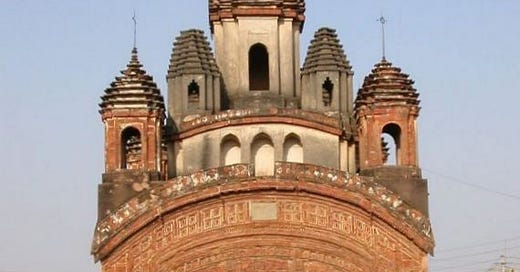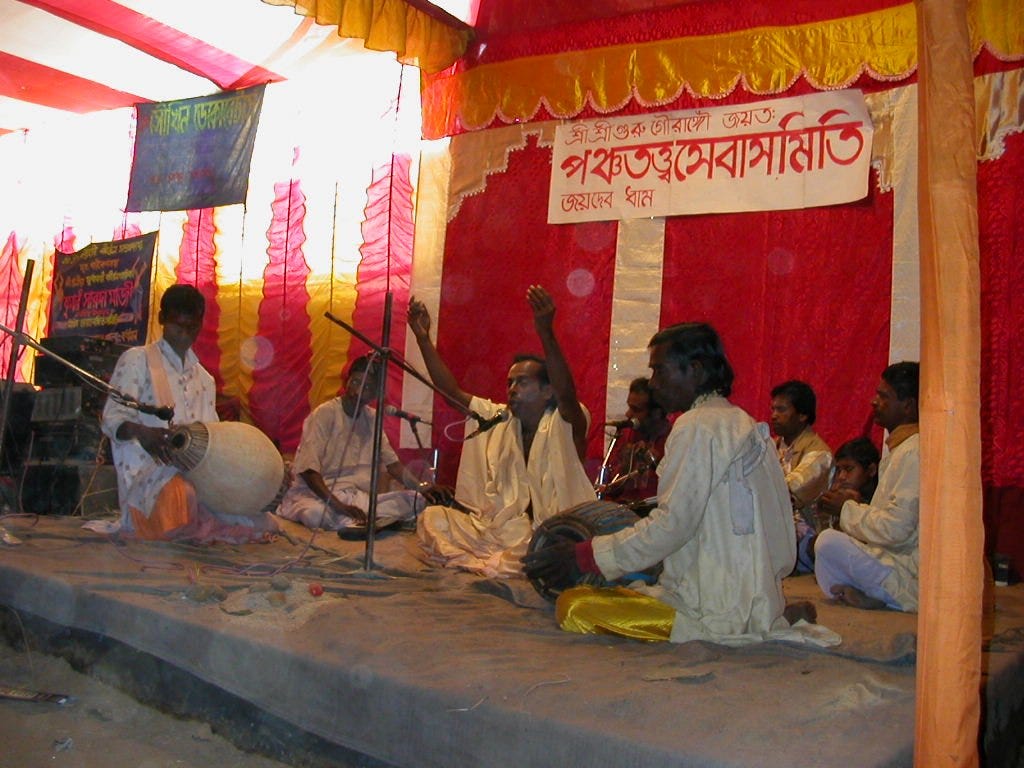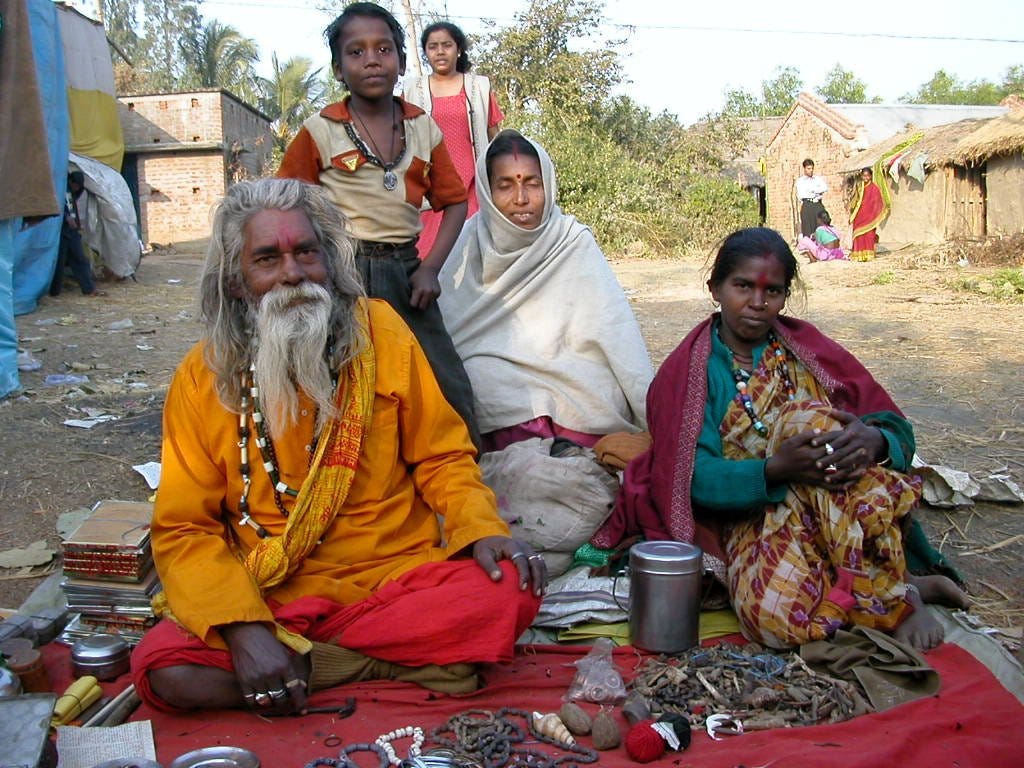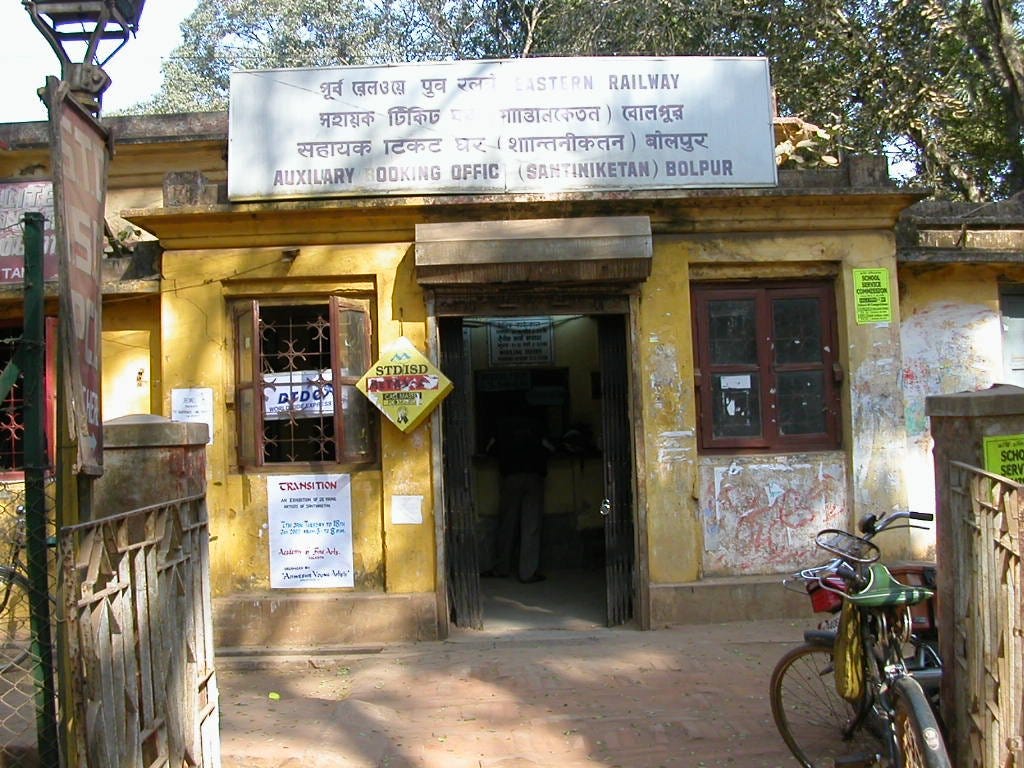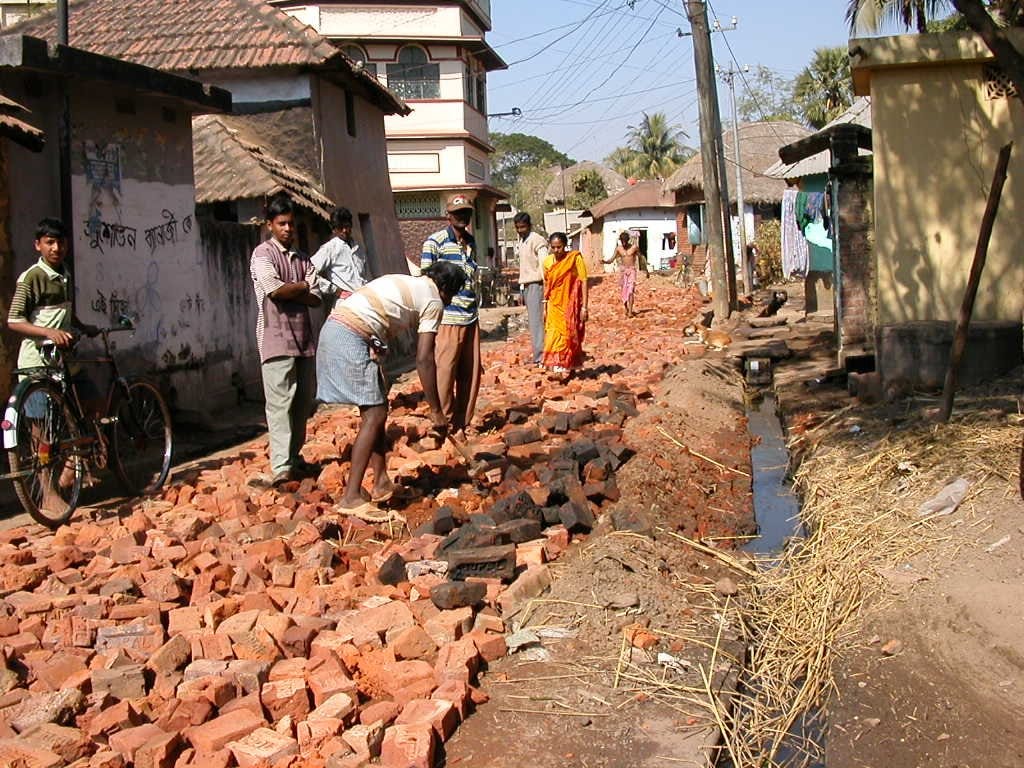You can support the author by making a donation at his Buy Me a Coffee page.
January 14th, Calcutta/Bolpur
I get up at 7 a.m., go out for breakfast (pineapple pancake, quite edible). Numerous people still huddling under thin blankets on the pavement where they had spent the night, which must have been pretty damned cold for them. Imagine having to do this night after night. Surely death is preferable.
I see the garbage collector. It's not a man driving a big truck. It's a man with a little two-wheeled cart, with a bin about a meter on each side. It's already full, but, accompanied by a dozen crows, he's trying to shovel rubbish from the street on top of what's already in it. He knows it's pointless, but it's a job.
I return to my hotel to pack, get fifteen minutes in at the cybercafe, get a taxi to Howrah railway station. It's packed. Wall-to-wall Indians. I find my platform number from the video display, find my train, find my carriage, find my seat. CC class, "air-conditioned chair car", costs three times second class. CC is only two-thirds occupied, whereas the second class carriages are packed to the rafters.
I get out two and a half hours later at Bolpur. All signs are in Bengali and are incomprehensible. The Rough Guide to India mentions Bolpur Lodge. I get a taxi to it, but I'm not impressed by the 250-rupee (US$5) room they show me. The taxi driver then takes me to the Hotel Rabindranath, which looks OK, has pleasant grounds, and they have a room for 200 rupees which is OK, but no hot water. Best I can get around here for the price.
I think of getting out to the Jaidev Mela. A car costs too much, so I go to the bus station down the road, and board a bus going to Kendubilwa, a.k.a Kenduli, but get off before it leaves. It's 3 p.m., and I don't know how long the bus will take (2 hours?), and I'm not sure how to get back, so I put off the trip until tomorrow. But I take the opportunity to buy a mosquito coil and to take a few first photos with my new Nikon Coolpix 2500 digital camera (bought in Singapore at a good price), mostly of the local people. I see no other Westerners, and apparently I'm an unusual sight for the local people, who are friendly enough, but none of them speak any English.
In rural India life moves very slowly. People sit around in tea stalls, or work desultorily, or amble down the road carrying various things. The hotel manager plays some card game with the porters. The sun sinks slowly behind the trees. It's very different from the chaos of Calcutta.
Rural India is primitive. Even more so than in countries like Morocco and Cambodia. Nothing works well. Perhaps what should be surprising is that in other countries, especially in the West, things work as well as they do, which we take for granted. The causes for things working in other countries seem not to be present in India, and consequently nothing works. All is allowed to decay. Efforts to improve things meet with constant failure. The country sinks back into sloth and inertia. The people cope somehow. This is, however, what appears at the physical level. West Bengal is said to be a center of rich cultural and intellectual life. But to a Westerner, not speaking Bengali, with little contact with the people, this remains mostly invisible.
I light the mosquito coil. Dinner in the hotel. Rice, dal, potatoes, mutton curry, papadam, all for 75 cents.
I transfer the photos I had taken to my laptop computer. Not too bad for a first effort, though only a few worth saving. All in focus and properly exposed, thanks to my Nikon.
My Chinese flashlight dies. I had wondered if it would last a week, but it lasted only a day. Cleverly constructed so that the on-off switch was no obstacle to the smooth rolling of the flashlight to the edge of the bedside table and the consequent dropping to the ground, a fall which proves fatal.
January 15th, Bolpur
Cold night. Even two blankets are not enough. It must be terrible for those poor devils who have to sleep in the street in Calcutta with just one (thin) blanket.
I wake at 9 a.m. No hot water for shaving. Would rather not shave than shave with cold water.
Breakfast at the hotel. About as basic as it could be. A couple of pieces of onion omelette, four small pieces of toast, and instant coffee with milk. But food, at least, and only 50 cents. I eat it at a plastic table in the garden, sitting on a plastic chair in the pale morning sunshine, birds twittering, orange flowers nearby, doing their flower thing, and rather well too.
I get hot water in a plastic mug so I can shave. Back in my room the fluorescent light begins to flicker and die, then goes out for good. Hotel porters say, fix it by 4 p.m. I request a new room. The manager takes the fluorescent light from above the reception desk and we all troop off to my room to change the light.
Today I want to go to the Jaidev Mela, by bus. But I also need to go to an internet place. Such places do exist in Bolpur, since I saw one while riding in the taxi. Also got to get a new flashlight. If I'd known my trusty eight-year-old rubber-coated flashlight was going to die so soon after I got to India then I'd have bought a new one before leaving. Here there's no hope of finding anything as good.
I decide to try to get a half-hour in at some internet place before going to the Jaidev Mela. I decide to try to get a half-hour in at some internet place before going to the Jaidev Mela. The rickshaw wallah doesn't understand where I want to go and takes me to the wrong place, but finally we find one, Didi's Cyberpoint. It's got just two PCs, and there is one person already waiting. I wait a half-hour then decide to leave for the mela, since it's already 12:30 p.m. But first I get a flashlight, a cheap plastic thing, but it works (and is still working a week later).
I arrive at the Bolpur bus station just in time to catch a bus to the mela. It's your typical grubby, rickety Indian bus, and it's a bumpy hour and a half to the mela.
Looks like it's mostly stalls selling pictures of Hindu deities and saints, in particular, Jaidev. He was the author of the Gita Govinda, a book about Krishna, and this place, Kenduli, is said to be the spiritual home of the Bauls. There's a nine-peaked terracotta temple here, built on the site of Jaidev's home. It looks to be pretty old. The facade depicts stories from the Ramayana and the Mahabharata along with a variety of Hindu deities.
There are several large tents with stages, where Baul singers (both male and female) perform. Some are performing. They sing in a fetching, lilting manner, though the Indian sound systems don't help much.
In one tent a young man introduces himself. Says I should come back at 6 p.m., since the Baul singers sing all night, until four in the morning. He's an astrologer, lives in Durgapur (not far from here). Gives me his card and invites me to visit him.
It seems I'm the only non-Indian at the mela. I attract many stares. Although I read (a few years ago) in the Rough Guide about Bauls performing at this mela, it appears that I'm the only Westerner this year who has made the trip, at least this afternoon.
I wander from tent to stall, then serendipitously wander into a tent where a male Baul singer is performing. I listen awhile, and the more I listen the more I realize that he's pretty good. In fact, he's so good that he could be one of the fabled master Baul singers. He's dressed in yellow and maroon, with right shoulder and chest bare, bald with long hair at the back. Accompanied by six musicians (cymbals, drums, violin and accordian) he sings with a strong voice, fervently, rhythmically, joyfully. I don't know what he's singing, but something about Krishna. It's wonderful to hear him. For this it was worth sitting three hours in the bus.
I arrive back in Bolpur after dark. I light the mosquito coil. But seems I got bitten already, on the leg, right through my trousers. Good thing I'm taking anti-malarial medicines (chloroquine and proguanil).
Dinner as last night, this time with a couple of pieces of chicken (mostly bone) in curry, some rice, dal and spicey vegetables. Having had only some peanuts for lunch I consumed it all quickly. Not much of a meal, but that's OK, I'm planning on losing weight in India. Three months in India is said to be an effective way to take off weight. Before leaving Singapore I weighed myself: 85 kg (with clothes). Let's see how many kilos I lose by the time I leave India.
January 16th, Bolpur
I get up at 9 a.m. and have breakfast as yestereday in the garden sitting in the morning sunshine. A larger omelette this morning. The newspaper in the hotel lobby is in Bengali, which is Greek to me. A porter brings me a 2-week-old Calcutta newspaper in English. I read that the Calcutta Municipality is taking disciplinary action against some senior employees because some low-level employees in their office were found to be playing cards, which is apparently quite common among low-level employees in government offiices. The Municipality officials want to institute "better workplace habits", though I suppose the low-level employees usually play cards because there's nothing much else for them to do.
After breakfast I ask for hot water for shaving, expecting a plastic mug, but get a bucket. So also take a "shower" (which in India means squatting and pouring water over one's head from a mug). Shaving cream getting low.
I'm the only Westerner at this hotel, though it's probably the best budget hotel in the Bolpur/Shantiniketan area.
I think I'll go out to Kenduli again today, maybe hear some more Baul singing.
I walk along the main road toward the railway station looking for an internet place. I find four, with signs outside saying "Internet", but each time when I go in to ask, the man says, "Sorry, no connection." Finally I find a place with three PCs which has a connection. But it's slowww... I can send a message, but cannot receive any. After forty minutes the phone line dies, so I give up.
It's 12:30 p.m., getting a bit late to go out to Kenduli. But I stand by the side of the road and a bus comes along which is going to the Jaidev Mela, so I hop on. Again it's a very bumpy hour and a half ride.
The fair is the same as yesterday, but this time I'm wearing flip-flops rather than boots, intending to enter the Jaidev temple. I buy some offerings (sweets, incense) for five rupees, pay two rupees to enter the temple, and the priest takes my offerings and offers them to the deity (Kali), who presumably blesses them, and the sweets are returned as prasad (food which has been blessed by the deity). I later give these to the hotel porters, who are pleased to get them.
I then go in search of Baul singers. The tent which yesterday was full of people, and where the master Baul singer was performing, is today almost empty, although there is a singer performing, with his backup. I go down near the stage. He's younger than yesterday's Baul, and not as good, but the more I listen the more I like it. As I leave I place my hands together in the Indian manner to offer my respects to the singer, who smiles radiantly and returns the gesture.
I enter another tent, where more Bauls are performing.
There's a principal singer accompanied by two drummers and a few other instrumentalists (cymbals, accordion, violin). The principal singer wears a robe or clothes of silk, whereas the other performers wear normal clothes. For the first song or two all are seated. At some point the principal singer stands and the singing becomes more intense. The two drummers stand also, though they may sit occasionally. The principal singer remains standing until the performance ends. He often holds his arms upwards, sways, and may perform a little dance (sometimes the drummers join in). He sings (drawing out the notes) or recites constantly, with more or less intensity, perhaps telling the audience of the splendor of God and the joy of connection with the divine.
Again I'm apparently the only Westerner at the Mela. I pass a sadhu sitting together with a woman, with things for sale. Unfortunately we have no language in common.
Back at the area where the buses leave from I catch a bus which is just leaving and is already full, and have to stand, squeezed in with the throng, for most of the way back to Bolpur, but at least I arrive back before nightfall.
In my hotel room I listen to the CD I bought in Singapore of some music of Delius (Naxos label, conducted by Sir Thomas Beecham, Vol. 2, including the "Walk to the Paradise Garden"). It's pretty awful stuff. Hard to understand that there was a Delius craze in the 1930s. One listening is enough for me. I'll leave the CD in the hotel room when I depart.
January 17th, Bolpur
It's cold at night. Two blankets are not quite enough. Sometime during the night I put my coat over them.
I wake at 8 a.m. Breakfast in the garden. Afterwards an Indian man comes and sits down. I tell him I came to Bolpur to attend the Jaidev Mela and hear the Baul singers. I ask him what they sing about. He says, about human life. Their songs are not so much religious, he says, as about life (though the two are not really separate, except to the modern secular mentality, which basically denies spiritual life in favor of the purely physical, in reaction to the pernicious effects of the domination of Western society by Christianity in earlier times).
I have a cold and a sore throat. I get a mug of hot water, which allows me to (i) gargle with warm salt and water, (ii) shave and (iii) shampoo.
Low energy, due to having this cold. I decide to walk in the direction of Shantiniketan, maybe find the Vichitra Museum, and look for internet places on the way. The road is dusty, and lined with Indian shops that probably haven't changed in fifty years.
I find a place called the Cybernet. It's possible to connect, but it's slowww... In two hours I get hardly anything done. Frustrating. The internet wallah apologizes for the slow connection. Bad in Bolpur; better, he says, in Bangalore and Madras. India has one of the largest IT industries in the world, but from North-East India you're lucky if you can access Yahoo from a dial-up connection. If the Thais and the Cambodians can manage to produce decent internet connections even from small towns why can't the Indians?
Lunch consists of some biscuits and a cup of tea.
I find the Shantiniketan branch of Eastern Railways Reservations.
The man behind the counter invites me in to his office, shares his glass of milky tea with me, and tells me what trains run each morning from Bolpur to Rampurhat, an hour or so away, which I have to go through to get to Tarapith, my next destination. I can't buy the ticket here though; have to go to the railway station in Bolpur. I tell him I'm going to Tarapith. "To see the monkeys?", he asks. No, I reply, to see the sadhus.
I find another internet place. The connection seems better, but one minute after connecting the power fails. The PC is still running, because it's connected to a UPS, but the modem has no power. I wonder why they don't connect the modem also to the UPS. But maybe when the power fails the phone line also dies. So I give up.
I find the Rabindranath Bhavan, wherein is the Vichitra Museum, but it's only a half-hour to closing time, so I decide to return tomorrow. I get a rickshaw back to the hotel, and take a photo of the rickshaw wallahs and later one of some children (dressed in rags, living in a slum, but delighted to have their photo taken).
Fish dinner, that is, a small slice of fish in curry plus the usual rice, dal, vegetables and papadam.
Cold getting worse. Danger of bronchitis. Time to hit the antibiotics. 500 mg Amoxycillin, twice a day, plus vitamins.
I ask the manager for an extra blanket, and am given one. No-one around here speaks much English. Conversation with the porters is simplified English such as, "Tomorrow stay?" Yes, tomorrow stay; don't feel like travelling in this condition.
Strange dream, in which there's a significant number of the population who belong to a cult of some kind, which answers all their questions and allows them to feel secure and content. To others such as myself they appear rather like zombies. It's 7 p.m. and I want to phone my (old) girlfriend to see if we can meet. Just as I'm about to enter a phone booth a guy tries to rush in before me. I wrestle him to the ground and push him away. But for some reason I can't make the phone call anyway.
January 18th, Bolpur
Bad cold. Fortunately the third blanket provides sufficient warmth. I should've asked for it before.
After breakfast I get a bucket of hot water to wash my dirty handkerchiefs and socks. In the West you just throw the laundry in the washing machine. Here you throw it in a bucket of hot water, add soap powder if you have any, a bar of soap if you don't, agitate it a few times, then leave it awhile. When the water has cooled down a bit you wash the clothes by hand, then rinse in a bucket of cold water. Not as good as your automatic 40-minute wash/rinse/spin cycle, but better than nothing. Hang to dry over a railing in the sun.
Back in my wonderful apartment where I used to live I had everything I needed and it looked good too. Here in India one is reduced to basics: poor food, hard mattress, coarse blankets, grubby bathrooms, doing your laundry by hand.
I feel awful, but need to get to the cybercafe, a 10-minute rickshaw ride away. Yuk.
Walking down a back lane I get some good pics of the local men and women working.
Curiously the lane is undergoing "road making". Or more exactly, about fifty yards of it has been covered by brickbats, making it impassable by rickshaws and very hard to walk over. There is a man with a sledge hammer, whose job it is to pound the brickbats to something smaller. In most other countries they would at least have run the brickbats through a crushing machine before dumping them in the lane, but maybe here they don't know what a crushing machine is. The man with the sledge hammer works slowly, with little effect, and I suspect it will take him months to complete the job. It's hard to imagine a more thankless job. I wonder whose bright idea this is. Maybe someone at the Public Works Dept. had a ton of brickbats from a demolished building. What to do with them? "Say, let's dump them all down some back lane and let the locals worry about them." Certainly the monsoon, six months from now, will turn this dirt lane to mud, but to dump a ton of brickbats on it, making it totally unusable, does not seem to me to be an improvement. Maybe they figure that after six months the man with the sledge hammer will have completed his task and the lane will be usable again before the monsoon arrives.
It's really shocking, the contrast between the abject poverty in which these Bengali villagers live and the comparative luxury in which most Westerners live. But affluence does not ensure happiness.
The connection at DiDi's Cyberpoint is working, but slow. I spend two hours and get done the most important of what I want to do. I talk with the girl running the internet place, an attractive Bengali lass. "Do you believe in God?", she asks. Sure, I say, thinking more-or-less of Brahman (both saguna and nirguna, that is, with and without qualities). Do you? "Yes" (of course). Which God? "Oh, there are many: Kali, Shiva, Vishnu, Durga, Krishna, Ganesh ..."
I get a rickshaw back into Bolpur to a pharmacy. Ask for Strepsils (sore throat lozenges). The man shakes his head, which in the West means "No" but in India means "Yes". Actually it's not exactly a simple shake of the head, but rather a nod and a shake combined. Then I ask for some codeine. He shakes/nods his head again but doesn't produce anything. Then I say, "cough medicine" and cough a few times, whereupon he produces some cough mixture with codeine.
Feel terrible. Bronchitis. Don't feel like doing anything when I'm sick like this.
January 19th, Bolpur
Sick. Get up at 10 a.m. After breakfast I sleep until 2 p.m. But it seems the worst is past. Lunch is a glass of sweet milky tea.
In the afternoon I sit in the sun and read Paul Davies' Are We Alone? about the possibility of extraterrestrial life. He discusses intelligently the question of how life arises in the universe, but doesn't quite arrive at the answer, namely, that this universe is one of a number of experiments conducted by God for the purpose of creating a world in which conscious life (and art) can emerge. This answer is inadmissible within orthodox Western physical science mostly because of science's historical genesis, specifically, its development in recent centuries in the face of opposition by Christian dogmatism.
Hinduism has no problem with this answer, and, indeed, it fits in well with the Hindu doctrine of the descent of God into a created physical world and the ascent of physical beings back toward cosmic consciousness. The ascent is the purpose of the descent, and the ascent is made possible by the nature of the physical world created by God. Not all creatable universes allow the emergence of conscious beings (illustrated by Davies' discussion of the effects of the particular values of the physical constants), so God may have to create numerous universes before finding one that allows the fulfillment of the divine purpose. (God likes a challenge, though there is no-one other than God who can provide a challenge.)
While sick and depressed I reflect on what I left behind so recently where I used to live. I was offered another year of work by two different researchers, though the offers came a bit late — after I had already arranged my departure. One said that if I didn't accept then the money would have to be returned to the government. I could even have chosen what to work on. But I never seriously considered staying, even though staying would have meant interesting work and probably would have meant assured survival, and leaving makes survival very uncertain. But it's not advisable to live in a country where you can be picked up off the street and locked away indefinitely without even any charges being laid.
I find under my mattress a T-shirt with a design containing some Italian words, and an old Bengali newspaper with a bloodstain. Possible explanation: This room was occupied by an Italian junkie who bled on the newspaper while shooting up. That would explain why he hid the newspaper under the mattress. But why did he also put his T-shirt there? It looks quite new, so I decide to keep it (after washing it).
Dinner as usual. I'm getting rather tired of chicken, rice, dal and vegetables.
A mosquito! I'd better light the mosquito coil.
January 20th, Bolpur
The cold spell continues across Northern India. Delhi airport was closed for nine hours due to freezing conditions. It's warmer down south, but I want to visit Tarapith, further north, before heading south to Puri and the sea.
Feeling a bit better. Bit of a stomach ache all day. Best to do nothing except visit the nearest internet place.
I find a restaurant; go in and sit at the only free table. Order dal fry (lentils; one can hardly go wrong with that) and what turns out to be the Bengali version of a chapati, a bit like a pancake. I observe about a dozen flies crawling over the table. None at the next table. Not sure why. Maybe because this table is closer to the kitchen. I move to the other one. The dal fry arrives with the chapati. It's not bad. The dal fry is sort of a mildly spicy lentil soup. I feel better after eating it.
The internet place is working. It's very cheap at a little over 60 US cents an hour, but frustratingly slow. It takes me two hours to get done what I want to do.
A couple of mosquitoes at dusk, but actually haven't seen many. It's probably too cold for them. And in my room only one cockroach sighted in a week.
At dinner (the usual) an old man wearing a dhoti and wrapped in a blanket, most of his front teeth gone, approaches and tries to teach me the names of the various kinds of dal, and how to say in Bengali "Give me rice", "Give me dal". I hope I won't need to use this. I can't grasp much, but do get the Bengali for "goodnight", "su ratri", and "good morning", "su pravat". Everyone is amused by my feeble efforts to learn a few words of their language.
Next: Kankalitali/Rampurhat/Tarapith
This article was formerly published on Peter Meyer’s website Serendipity. It is also available on the Serendipity website on flash drive (whose hundreds of articles are readable on PCs and Macs which have a USB port). Please support him by purchasing a copy of this flash drive (a.k.a. thumb drive or memory stick). Or copies of all three of his flash drives.
.
